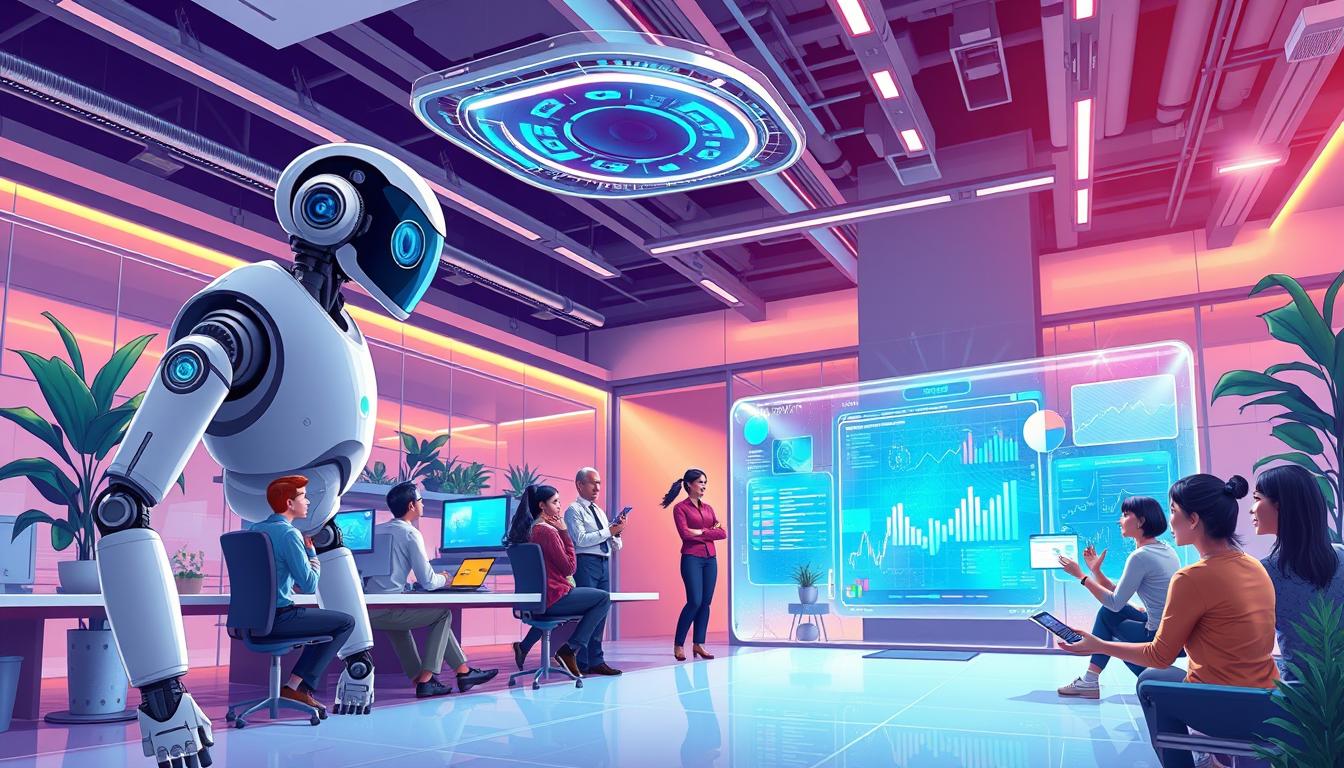AI Reshaping the Future of Work: What to Expect
Are we on the brink of an AI revolution that will change our workplaces forever? Artificial intelligence in the workplace is growing fast. It’s now a reality that’s changing jobs and industries quickly.
AI is making a big impact in many areas. SambaNova Systems, a big player in AI, is working in Saudi Arabia. They’re helping Aramco, Saudi Arabia’s biggest company, use AI for better intelligence.
This shows how AI is being used in real ways. It’s backed by a huge $40 billion plan to invest in AI technology. This plan shows how important AI job automation is becoming.
But AI also brings challenges. Kohl’s recent report shows a 4.2% drop in sales. This highlights the need for new ideas in retail. Could AI help save struggling industries? As we move into this AI world, it’s key to know how it will change our jobs and what skills we’ll need.
Key Takeaways
- AI is rapidly transforming workplaces across industries
- Major investments are being made in AI technology globally
- AI systems are being deployed for internal intelligence in large corporations
- AI job automation is becoming increasingly prevalent
- Businesses are looking to AI for solutions to economic challenges
- Adapting to AI-driven workplaces requires new skills and approaches
The Rise of AI in the Workplace
AI is changing how we work, but it’s not without its hurdles. A RAND report shows that 80% of AI projects don’t make it. Success depends on people and how we work, not just the tech. As AI grows, so does the debate about its effect on jobs.
Historical Context of AI Adoption
AI’s journey in the workplace has been gradual. Like electricity, AI is slowly changing our tech world. Early days saw simple automation, but now AI handles complex tasks across many fields.
Current Trends in AI Implementation
AI is now big in software development. 64% of developers use AI every day, with 33% using it for coding. Tools like ChatGPT and GitHub Copilot are popular. Yet, 23% of developers worry AI might replace their jobs.
Projections for AI Growth
AI’s future looks promising, but adoption varies by industry. Manufacturing and agriculture use AI less. Finance, however, is embracing AI for better investments and customer service. As AI advances, focusing on AI and human teamwork will be crucial to handle job impact.
| Sector | AI Adoption Rate | Key AI Applications |
|---|---|---|
| Software Development | High | Code writing, debugging |
| Finance | Growing | Risk assessment, fraud detection |
| Manufacturing | Low | Quality control, predictive maintenance |
| Agriculture | Low | Crop monitoring, yield prediction |
AI and Job Automation: Challenges and Opportunities
The rise of AI job automation is changing industries worldwide. Companies using AI are showing its big impact on jobs. This change brings both challenges and chances for workers and businesses.
AI is changing old job roles. For example, in farming, Kubota North America Corp bought Bloomfield Robotics Inc. This shows AI’s big change in farming. Bloomfield’s tech uses cameras on tractors to take detailed images of plants, helping growers in many places.
While AI might replace some jobs, it also creates new ones. The U.S. Department of Agriculture gave nearly $121 million to research in specialty crops and organic farming. This shows the need for AI skills in many areas.
“AI job automation is not about replacing humans, but augmenting their capabilities and creating new, high-skilled positions.”
The effect of AI on jobs is not just in farming. Here are some facts:
- More households use smart assistants for daily tasks
- AI helps suggest products online
- AI chatbots help with medical advice in apps
- Small businesses use AI for marketing and managing stock
- AI handles more routine customer service questions
These trends show we need to learn new skills for the changing job market. Companies are working on how humans and AI can work together. This helps solve worries about job security.
| AI Impact Area | Challenge | Opportunity |
|---|---|---|
| Agriculture | Traditional farming jobs may decline | New roles in AI-powered agricultural technology |
| Customer Service | Reduction in entry-level positions | Focus on complex problem-solving and relationship building |
| Healthcare | Potential job displacement in administrative roles | Enhanced patient care and new specializations in AI-assisted diagnostics |
| Retail | Fewer cashier positions | Growth in data analysis and personalized shopping experience roles |
As AI keeps getting better, it’s key for workers and businesses to adapt. We should focus on learning skills that work with AI. This will help us innovate in our fields.
The Future of Work with AI
The workplace is changing fast with AI. It’s changing jobs and creating new ones. The future looks exciting but also brings challenges.
Evolving Job Roles
AI is changing jobs in many fields. For example, developers use tools like Cursor AI. It helps with code and suggestions.
This lets developers work on harder problems. They don’t have to do simple coding tasks anymore.
Emerging Career Paths
New jobs are coming as AI grows. We need more data scientists, AI ethicists, and machine learning engineers. The o1 model from OpenAI shows AI’s power in math and science.
This hints at more jobs in AI research and development.
AI and Human Collaboration
Working well with AI is key in today’s jobs. AI is great at analyzing data and finding patterns. But, humans are still needed for creativity and thinking.
In law, AI helps with research and analysis. This lets lawyers talk to clients and make big decisions.
“The future of work isn’t about humans versus AI, it’s about humans and AI working together to achieve better outcomes.”
To succeed in the future, we need to learn AI skills. We also need to adapt to new job roles.
Developing AI Skills for the Workforce of Tomorrow
Artificial intelligence is changing the job market fast. Workers need to learn new AI skills to keep up. Companies are looking for people with AI knowledge.
General Motors is searching for a Head of Agency Relations & Partnerships. This job needs leadership and AI knowledge. It shows how AI is changing old roles in big companies.
The finance world is also seeing AI’s impact. Many firms struggle to find the right people for finance jobs. This shows the need for AI training across different fields.
- Over 600 US-listed companies missed filing deadlines due to staff shortages
- CFOs lack confidence in their organization’s ability to lead AI transformations
- The digital CFO concept has been discussed for decades with limited success
India is becoming a top spot for AI talent. It has the highest AI skill rates globally. This success comes from strong training and partnerships, like Birlasoft’s Skillfolio program.
To get ready for the AI future, workers need to improve both technical and soft skills. Skills like data analysis, machine learning, and critical thinking are key. Keeping up with new skills is essential in this fast-changing world.
AI’s Impact on Workplace Productivity and Efficiency
Artificial intelligence is changing how we work. AI tools are making business processes more efficient and opening up new opportunities. Let’s see how AI is impacting companies globally.
AI-powered Productivity Tools
AI tools are transforming office tasks. For example, ChatGPT o1 automates tasks like writing emails and scheduling meetings. This lets employees focus on important tasks that help the business grow.
Streamlining Business Processes with AI
AI is changing core business functions in many industries. In manufacturing, AI checks product images for defects that humans can’t see. It also helps manage inventory by predicting raw material needs.
Case Studies of Successful AI Implementation
AI adoption has its challenges, but success stories show its value. For example, AI in supply chain management has made demand forecasting more accurate. Customer service chatbots have also improved response times and customer satisfaction. In manufacturing, AI has reduced downtime and costs through predictive maintenance.
| AI Application | Benefit | Success Rate |
|---|---|---|
| Product Defect Detection | Improved Quality Control | 95% |
| Demand Forecasting | Optimized Inventory | 85% |
| Energy Usage Optimization | Cost Reduction | 75% |
Despite successes, 80% of AI projects fail. Success comes from focusing on people and work methods (70%) more than technology (30%). As AI changes the job market, companies need to develop soft skills and AI literacy to keep their workforce ready for the future.
Ethical Considerations in AI-Driven Workplaces
AI is changing the workplace, and ethics are key. Companies face challenges like data privacy and bias in algorithms. It’s important to use AI responsibly in making decisions.
A recent conference at IIM Jammu talked about AI, ethics, and human skills. Leaders shared how to train workers for AI and teamwork.
“The goal is to ensure that AI implementation truly reflects the opinions of all stakeholders, not just those in urban centers.”
Many companies are creating AI ethics rules and setting up oversight groups. These steps help make AI fair and open. They also make sure AI’s benefits are balanced with ethics.
- Data privacy protection
- Mitigation of algorithmic bias
- Responsible AI decision-making processes
- Transparency in AI operations
As AI grows, companies must focus on ethical AI. This builds trust and prepares for future AI and human teamwork.
AI and Decision-Making in Business
AI is changing how businesses work. Companies use AI tools to stay ahead and work more efficiently. This change is big for jobs in AI across many fields.
AI-assisted Strategic Planning
AI is changing how businesses plan. It looks at lots of data to find trends and predict the future. This makes decisions better and helps use resources wisely.
Data-driven Insights for Better Decisions
AI gives insights that make decisions better. These insights help find chances, avoid risks, and improve how things work. Jobs are changing to focus more on understanding data and making plans.
| AI Application | Business Impact | Employment Effect |
|---|---|---|
| Customer Service AI | 70% query resolution | Shift to complex problem-solving roles |
| Financial Robo-advisors | Cost reduction, increased returns | Growth in AI management positions |
| AI Agents | Efficiency gains, new revenue streams | Demand for AI specialists and trainers |
Balancing AI and Human Intuition
AI gives great insights, but human touch is still key. Leaders are learning to mix AI advice with their own experience. This mix makes sure big decisions are smart and well-rounded.
“The key to successful AI implementation is not just in the technology, but in developing the human skills to work alongside it.”
AI’s role in business decisions is growing. It’s changing jobs to focus on creativity, feeling, and big thinking. These skills work well with AI’s ability to analyze data.
The Role of AI in Promoting Workplace Diversity and Inclusion
AI and workplace diversity are now closely linked. Companies aim to make their workplaces more inclusive. They use AI to cut down on human bias in hiring and promotions. This helps create a more diverse team.
Ethical AI is key in promoting diversity and inclusion. AI tools can spot and reduce unconscious biases in hiring and evaluations. This has shown to be very effective:
- 37% increase in workplace diversity after implementing AI solutions in recruitment
- 43% reduction in bias during the hiring process when utilizing AI algorithms
- 25% increase in employee satisfaction rates following AI-driven diversity programs
Companies like Hansen Technologies and Meraki in Norway are at the forefront. They sponsor work visas for foreign talent. This makes their workforce more diverse and addresses skill gaps.
| AI Impact on Diversity | Percentage Improvement |
|---|---|
| Gender diversity in leadership roles | 15% |
| Productivity in diverse teams | 28% |
| Innovation from diversity initiatives | 56% |
AI has a lot of potential in promoting diversity. But, it’s important to make sure AI systems don’t add to biases. Companies need to keep checking and improving their AI tools. This ensures workplaces are truly inclusive and value diversity.
Conclusion: Embracing AI for a Transformative Future of Work
The future of work with AI is changing fast, reshaping many industries and opening new doors. Schools and universities are updating their programs to keep up with these changes. Places like MIT-WPU and Woxsen are adding AI and machine learning to their business courses.
AI is also changing how businesses work. Companies are using AI for better data analysis, making decisions, and improving processes. This means we need more people who know how to program, use statistical tools, and work with machine learning.
To meet this need, schools are teaming up with tech companies. They offer internships and encourage students to get extra certifications. This helps prepare the next generation for an AI-driven world.
Looking ahead, it’s clear we must embrace these AI changes. It’s not just about using new tech. It’s about creating a culture of learning, ethics, and working well with AI. By doing this, companies can become more productive, find new solutions, and create more welcoming workplaces.
Source Links
- Startup of the Week – US-based SambaNova sets sights on Saudi market
- Kohl’s Aims to Refine Its Image as a Top Value Hub for Families | PYMNTS.com
- Prioritize Human Factors: The Hidden Key to AI Project Success
- The Rise of AI in Software Development: Key Insights from the 2024 Docker AI Trends Report
- The FSA’s FY2024 Administrative Policy
- Kubota acquires Bloomfield Robotics to track specialty crop health – The Robot Report
- The Impact of AI in Everyday Life
- These two friends built a simple tool to transfer playlists between Apple Music and Spotify, and it works great | TechCrunch
- Using Cursor AI as Part of Your Development Workflow
- ChatGPT o1 is the new ‘strawberry’ model from OpenAI — 5 prompts to try it out
- The Future of Personal Injury Law: Embracing AI and Legal Technology
- Head of Agency Relations, Licensing & Partnerships
- The impact of AI on finance transformation
- India’s engineers are poised to make India a global leader in AI innovation
- How Manufacturers Can Use Governed Data and AI for Operational Excellence
- ChatGPT o1 for Everyday Office Tasks: A Complete Guide for Employees
- Fostering Academia and Industry Partnerships – The Way Ahead: IIM Jammu Hosts Roundtable Conference & Alumni Meet at Bengalaru
- Arizona opinion: Prop 134: Ensuring every Arizonan has a voice
- Uber to dispatch Waymo’s robotaxis in Austin and Atlanta next year
- Blockchain-Based Healthcare Records Management Framework: Enhancing Security, Privacy, and Interoperability
- The AI Agents Revolution: What Every Executive Needs to Know
- Latest Norway Government Jobs with Free Work Visa 2024 | Quick Hiring
- Marketing Technology Program Manager | Careers at PayPal
- Management education is evolving, thanks to the rise of AI and digital technologies
- How to Manage and Monitor Your MyKohlsCard Account Online – Vents Magazine
- The Importance of Data-Driven Decision Making for Startup Success







